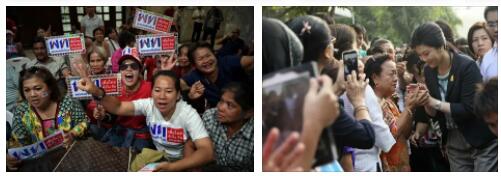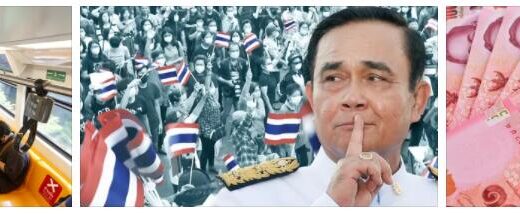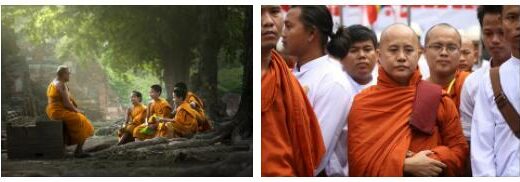Thailand Elections
Thailand voted
On March 24, was in Thailand – after five years of military dictatorship – elected. The results were surprising. The electoral winner seems to be initially the Palang Pracharat party (“The Power of the People’s State Party”) founded by the junta. It received almost eight million votes. Party (“For Thailand Party”, 7.4 million votes) got the most seats in parliament. This is because it won 135 direct seats, together with the newly formed Anakhot Mai (“New Future Party “, almost 6 million votes)) and some smaller parties, the anti-military camp together has around 15 million votes and the majority of elected seats in parliament.
Under the new constitution, however, the parliament will be composed of 500 members of the House of Representatives and 250 senators. The 250 seats in the Senate are not elected, but determined by the military regime, the so-called National Council for Peace and Order (NCPO). In order to be elected as prime minister, the currently ruling military dictator, Prayuth Chanocha, only needs 176 seats of the 500 members to be elected (376 of 750). Both the Palang Pracharat party and the Phuea Thai party have tried to put together a coalition government.
The loser in the election is the “Democratic Party” – which is so hated by many Thais for its role in cracking down the red shirt protests in 2010 that it is called the “Cockroach Party”. She has lost her stronghold in Bangkok. Party leader Abhisit Vejjajiva has resigned. The pro-junta party of Suthep Thauksuban (who led the protests against the last elected government), Phak Ruam Phalang Chat Thai (Action Committee for Thailand Party), embarrassed itself with only 400,000 votes.
The clear winner is Anakhot Mai. She wants to change the anti-democratic constitution, curtail the power of the military and also cut the military budget. She presents herself as a young force who wants to overcome the polarization between red shirts and yellow shirts. Your good performance in Bangkok could change the political landscape permanently.
The elections were neither free nor fair. There are several inconsistencies have been found. The junta and the partisan courts and electoral commission intervened repeatedly in the election campaign. One of the most influential parties, the Thai Raksa Chart (“Thais Save the Nation Party”) was banned after it put Ubol Ratana, the sister of the current King Vajiralongkorn, as the top candidate. Thanathorn Juangroongruangkit, top candidate of the Anakhot Mai party (“New Future Party”), is charged with cybercrime. The media is still heavily censored.
Programmatically, the pro-military and anti-military parties have tried to copy the policies of former Prime Minister Thaksin Shinawatra. The Palang Pracharat party promises to raise the minimum wage from 300 to 450 baht. The “Democrats” want to significantly increase the wages for unskilled workers, raise the top tax rate, and introduce guaranteed minimum prices for the farmers. The tax-financed health system introduced by Thaksin (“30 baht program) will not be affected.
When are the elections coming?
It is now official, the election will take place on March 24, 2019. Military dictator Prayuth Chan-Ocha has promised elections several times since the 2014 coup and has repeatedly postponed the date. Many were skeptical whether the promise would be kept. The renewed postponement could be related to the fact that the military still wants to provide government for the coronation of Vajiralongkorn, which is scheduled for early May. However, a law passed by the military government in September 2018 prescribes elections until May 9, 2019.
Despite many difficulties, there is already movement in the party landscape. The junta has allowed the registration of new parties and appears to be preparing a new party even with old political pullers. New parties have been allowed to form since the summer, and since the beginning of December 2018 they have been allowed to campaign. If the elections go well, General Prayuth would like to be prime minister himself. Political deals are already being prepared for this.
The red shirts are waiting for the new elections and are hoping for a victory for the Thaksin-affiliated Phuea Thai party. Others put their hopes in another multi-billionaire – Thanathorn Juanggroongruangkit – who with his party “New Future” (Anakot Mai) is considered a kind of Thai Macron. He is viewed critically by others for the same reason. Anakot Mai also positions himself against the political influence of the super-rich and the military. An alternative is the “Commoners Party”, which presents itself as the party of the working classes. Even in youth sentiment against the military seems to be spreading. A coalition between Phuea Thai and Anakot Mai could bring Thaksin-loyal voters from the poorer classes together with the liberal urban youth. If such a coalition wins the election, the next conflict with the military is inevitable.
Meanwhile, the military regime tries to improve its reputation through royalist propaganda and relief operations by the army. If the military-critical opposition were to win the elections, various mechanisms are anchored in the new constitution to prevent changes that are too great. Despite the postponement of elections, the EU wants to reestablish political relations with the dictatorship. It has shipped millions of dollars in arms to Thailand since the coup. Angela Merkel had lunch with the dictator. After the elections, EU relations will normalizeto a country that is still ruled by the military.



